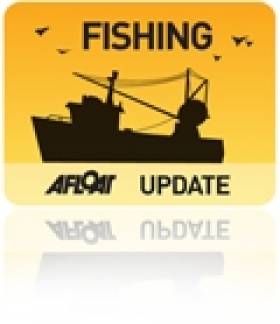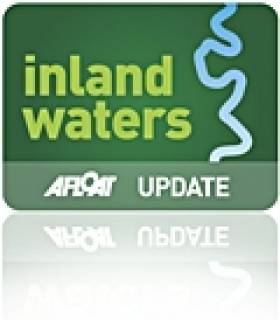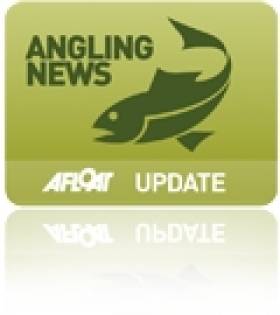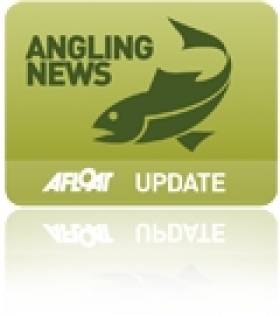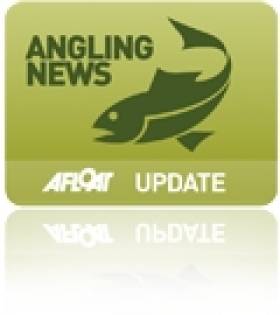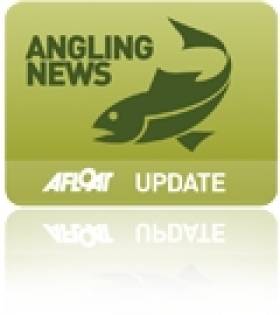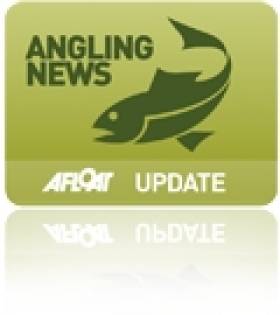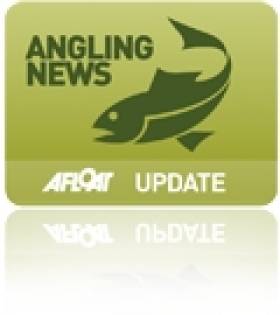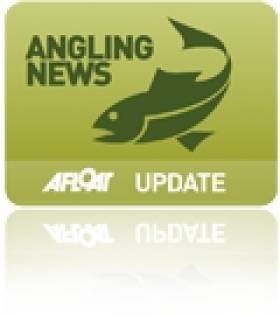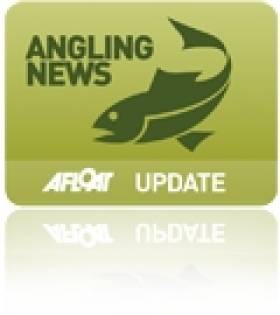Displaying items by tag: Salmon
Salmon Farm Licence Assignments Approved in Connemara
#salmon – The future of salmon farming in South Connemara got a considerable boost today following the the assignment of aquaculture licences from five separate operators to Bradán Beo Teoranta, a company established by Údarás na Gaeltachta to consolidate and revitalise the operation of sustainable salmon farming in the area.
The Minister for Agriculture, Food and the Marine, Simon Coveney TD, approved the assignments. The assignment of the licences took place with the agreement of the former licence holders and follows a lengthy examination of all issues associated with salmon farming in South Connemara by the Department of Agriculture, Food and the Marine, Údarás na Gaeltachta and the Department of Arts, Heritage and the Gaeltacht.
Commenting on the assignment Minister Coveney said "This assignment of licences will consolidate operations in one licence holder and thereby greatly assist in the sustainable development of salmon farming in the area while also ensuring the maximum ongoing protection of the environment. The initiative provides a good example of Government Departments and State Agencies working together to secure a solid future for employment in the aquaculture industry".
The aquaculture licences assigned to Bradán Beo Teo were formerly held by the following companies: DMCI Golam Teo.,
Muirachmhainni Teo., Eisc Ui Fhlathartha Teo., Eisc Iathglas Teo, Muir Gheal Teo.
IFI Investigates Fish Mortalities on River Vartry
#INLAND WATERWAYS - Staff at Inland Fisheries Ireland (IFI) staff are continuing their investigation of fish mortalities on a 9km stretch of the River Vartry in Wicklow
Both adult and juvenile salmon were found dead over the stretch of the Vartry from Roundwood downstream of the reservoir to Ashford, following a complaint received by the IFI last Thursday 28 June.
During the investigation IFI staff also noted the presence of live fish along the affected stretch.
Precise numbers of dead fish have not yet been confirmed due to the high water levels and recent heavy rains.
The news comes after growing concerns at the "worrying fall" in wild salmon numbers in Ireland's lakes and rivers, which has already prompted voluntary conservation measures on the Foyle system.
#ANGLING - Inland Fisheries Ireland (IFI) has been successful in a circuit court case against a Louth man who appealed a district court decision over illegal salmon fishing.
Pat Smith of Annagassan, who was appealing the severity of the sentence handed down by the District Court in April last year, was ordered to pay two fines totalling €600 and costs of €2,369 to IFI in a hearing at Dundalk Circuit Court on Friday 11 May.
Smith was found to be illegally fishing in September 2010 after fisheries officers from the Dundalk district apprehended him with a fixed net at the shores of Annagassan, the tidal section of the Dee and Glyde rivers.
Court proceedings were initiated and on 14 April 2011 Smith was convicted and fined €600 and ordered to pay total costs of €880 to Inland Fisheries Ireland.
Smith appealed this case on two counts: first on the townland where the incident took place, and secondly on the severity of the sentence. The first count was dropped by the defendant just before proceedings began in the circuit court.
On the second count witness Assistant Inspector Ronan O’Brien gave evidence of events of the day in question and outlined that all rivers on the East Coast, with the exception of the River Fane, were closed for salmon fishing due to declining salmon stocks.
Judge Terry O’Sullivan stated that the offence committed was serious and had to be treated as such because salmon stocks were in decline around the country and were an important part of our heritage. He ordered Smith to pay both fines totalling €600 within six months by default or face six months imprisonment. The judge also ordered him to pay total costs of €2,369 to IFI with six months to pay.
Since 2006 IFI has engaged in conservation measures to combat the decline in salmon numbers. This resulted in an end to the interceptory mixed stock fishery for salmon throughout Ireland, and affected newsmen who availed of the Hardship Scheme were compensated for their loss.
As previously reported on Afloat.ie, the IFI Salmon Conservation Scheme has been extended through this year, with funding increased to a total of €200,000.
The pilot scheme will facilitate the rehabilitation of salmon stocks, giving priority to rivers below their conservation limit which have the greatest prospect of recovery.
According to IFI: "At the peak of salmon production in the 1970s, approximately 3,000 salmon were caught commercially in Dundalk waters. This declined to an all time low in 2006 when only 225 were caught in the entire Dundalk bay area. Annagassan would have been a traditional location for poaching salmon and sea trout in the past.
"Consequently all the rivers on the East coast, with the exception of the River Fane, were closed for salmon fishing. Only this year are the Castletown, Glyde and Dee rivers open for catch-and-release only."
The fisheries body added: "It is hoped that these measures will preserve our stock of Atlantic salmon, which are not only a valuable resource for our economy, but also an important part of our natural heritage as salmon and trout have been running our rivers since the last ice age."
Members of the public can report incidents of poaching and pollution to the IFI at freephone 1890 34 74 24 or for easier recall 1890 FISH 24.
Enniscorthy Anglers Reach Agreement Over Slaney Salmon
#ANGLING - Enniscorthy anglers have reached an agreement with Inland Fisheries Ireland (IFI) over the use of shrimp as bait to catch the Slaney's prized salmon, according to the Enniscorthy Guardian.
The Enniscorthy Local Anglers Association has also agreed with IFI officials not to overfish the river when levels are low.
New signage has now been installed along the river through the town reminding salmon anglers that no more than 15 rods will be allowed at any one time when the water is running low.
All fish must also be returned to the Slaney as per the agreement.
As previously reported on Afloat.ie, the Wexford town's anglers had secured the support of the IFI board in their call to prevent the threatened ban on using shrimp as bait.
Members of the Enniscorthy Local Anglers group argued that shrimp is ideal bait for catching salmon downstream, and said they were "baffled" by the ban on its use by IFI officials.
Pickings have been slim so far this season, with only one fish caught since it began a month ago. But local angler Kris Murphy is "generally optimistic" about the river's salmon stocks.
The Enniscorthy Guardian has more on the story HERE.
Draft Net Season Won't Be Brought Forward Says Minister
#ANGLING - Minister for Natural Resources Fergus O’Dowd has confirmed that there is no proposal for the extension of the salmon draft netting season.
In response to concerns expressed by the angling community and highlighted by Derek Evans in The Irish Times last week, Minister O’Dowd emphasised that conservation and management of salmon and sea trout is key to protecting our valuable natural resources.
“Recent reports that the commercial season will be extended in certain rivers are untrue and I can confirm that for the 2012 season, the commercial fishing season remains as it was in all areas, with the River Suir still on a reduced season for snap fishing," said the minister.
"I am aware that confusion can arise due to the necessary extent of regulations in place. However, I am not considering any proposal for the extension of the commercial season."
The minister reminded that Inland Fisheries Ireland is the body that enforces Ireland's "extensive" fisheries legislation.
"IFI has offices throughout the country where advice can be sought. There is also a comprehensive and regularly updated website and information is also disseminated on Facebook and Twitter," he said.
Meanwhile, IFI chief executive Dr Ciaran Byrne said that the legislative code is regularly updated to ensure that Ireland's fisheries continue to be protected on the basis of information from IFI’s Standing Scientific Committee and IFI management advice.
“Only rivers with exploitable surpluses are open during the spring season and no fishery is open for commercial exploitation during this time," said Dr Byrne. "Fisheries that are classified catch-and-release or closed for salmon are now protected under bye-law 897 which prohibits the use of worms and the use of any fish hooks other than single barbless hooks.
"IFI’s priorities are maximising the return to Ireland, protecting sustainable jobs in isolated rural communities and promoting our wonderful angling resources," he added.
Survey to Assess Value of Irish Angling
#ANGLING - Inland Fisheries Ireland (IFI) has appointed Tourism Development International (TDI) to undertake a Socio-Economic Survey of Recreational Angling in Ireland.
The overall objective of the survey, which will run over the course of 2012, is to establish the current volume and value of domestic and overseas recreational angling in the country.
Pike, coarse fish, bass, salmon, sea trout, brown trout and sea anglers will all be invited to participate in what is described as Ireland's most comprehensive angling survey undertaken in decades.
The survey will inform IFI and its tourism partners in relation to the business of angling in Ireland and also enable improved strategic planning and decision-making in terms of product development and marketing.
"Anglers are the key to this survey," commented Minister of State for Natural Resources Fergus O'Dowd. "They know the resource and they understand the importance of sustainability. What anglers contribute to Ireland’s economy is unknown but I am certain that it is significant.
"Angling takes place in every river and lake in Ireland and all around our coastline. There is no town or village in Ireland that doesn’t have anglers."
He added: "It is imperative that the inland fisheries and sea angling resources are managed in the best way possible to ensure enjoyment for our local and visiting anglers, sustainable jobs in rural communities and maximising its potential to add to Ireland’s economy.
"Getting the right information from those most involved will greatly assist in improving the angling product."
The survey comprises two parts: a household survey and a survey of recreational anglers which will commence in April. Anglers will be met at fishing locations throughout Ireland and invited to participate there and then, or later by phone or online. IFI says that every effort will be made to accommodate participation.
- angling
- Inland Fisheries Ireland
- IFI
- Tourism Development International
- TDI
- survey
- SocioEconomic Survey of Recreational Angling in Ireland
- Pike
- Salmon
- Sea Trout
- brown trout
- coarse angling
- sea angling
- tourism
- business
- marketing
- development
- Minister of State for Natural Resources
- Fergus O'Dowd
- sustainability
- inland waterways
- jobs
NI Anglers Take to Facebook to Save Their Salmon
#ANGLING - Northern Ireland river anglers are taking a novel approach to lobbying Stormont over salmon exploitation by harnessing the power of social networking.
According to the News Letter, the NoSalmonNets campaigners "have swapped their fishing rods for laptop computers", using Facebook to attract support for their campaign to bring an end to the offshore netting of wild salmon stocks.
As previously reported on Afloat.ie, Northern Ireland's Department of Culture, Arts and Leisure (DCAL) has called for a voluntary ban on offshore salmon fishing, following new research that shows a significant drop in their numbers in the North's rivers.
Seamus Donnelly of NoSalmonNets has welcomed DCAL's recent decision to stop issusing licences for commercial salmon nets that may "contravene European law" off Antrim's north coast, made in an effort to protect salmon stocks in the Foyle river system.
Donnelly explained that the campaign was borne from frustration at the apparent inaction by the NI Executive over the protection of salmon.
“One of the keys to our success has to be Facebook," he said. "The internet has an unlimited reach and we took advantage of that.”
The News Letter has more on the story HERE.
NI Taxpayers Could Foot the Bill for Fines Over Dwindling Salmon Stocks
#ANGLING - Northern Ireland's taxpayers could be left with a bill for millions in EU fines if action isn't taken to reverse the decline of salmon stocks, the News Letter reports.
Ulster Unionist MLA Robin Swann said he believes that voluntary measures to help protect the North's Altantic salmon will not remove the threat of "fines which would likely run into millions which [the people of NI] will end up paying".
As previously reported on Afloat.ie, NI's Fisheries Minister Carál Ní Chuilín called on offshore anglers and commercial fishermen to forego applying for 2012 salmon licences.
Annual monitoring of the North's salmon rivers has shown a failure to reach targets most years since 2002, with the survival rate of salmon in the marine phases in some cases dropping to as little as 5%.
Coastal drift nets and bag nets off the north Antrim coast - which contravene EU directives - have been blamed for intercepting salmon stocks before they reach the rivers, and anglers and conservation groups have already called for a ban.
But Swann says that Department of Culture, Arts and Leisure (DCAL) does not yet have the legislative power to stop them.
The News Letter has more on the story HERE.
Special Angling Event Produces First Salmon of 2012
#ANGLING - The first wild Atlantic spring salmon of 2012 was caught Sunday on the River Liffey in exceptional circumstances, The Irish Times reports.
Though the river is closed for salmon fishing as stocks are currently below sustainable levels, Inland Fisheries Ireland sanctioned a special catch-and-release club event for survey reasons at Islandbridge in the capital.
Declan Briggs – a 47-year veteran of the Dublin and District Salmon Anglers' Association - landed the 8.5lb beauty using a wooden Devon lure at 9.50am.
“This is my first time to catch the first fish. I’m absolutely delighted," he said.
Elsewhere in Ireland, Briggs' catch was mirrored by Tyrone man Ian Martin, who caught the northern region's first salmon on the year on the River Drownes near Bundoran.
The Irish Times has more on the story HERE.
Salmon Conservation Scheme Extended to 2012
#ANGLING - Inland Fisheries Ireland's Salmon Conservation Scheme has been extended into 2012, with funding increased to a total of €200,000.
The pilot scheme will facilitate the rehabilitation of salmon stocks, giving priority to rivers below their conservation limit which have the greatest prospect of recovery.
Applications are now being invited for salmon conservation projects, to a maximum value of €10,000 per project. Applicants must outline the benefits of the project, the ability to plan and complete the project, and value for money. Any statutory approvals necessary, such as planning permission, must be in place.
Examples of schemes that can be funded include: fish passage improvement; spawning enhancement, instream structures such as weirs and deflectors; river bank protection; tree pruning and planting; and removal of invasive species.
Minister for Communiations, Energy and Natural Resources, Pat Rabbitte, commented: "This scheme has been proven to enhance habitat, knowledge and ultimately the wonderful angling and commercial fisheries we enjoy in Ireland adding benefit to local economies."
Application forms are available from the Inland Fisheries Ireland website HERE.
The closing date for applications is 31 March 2012.


























